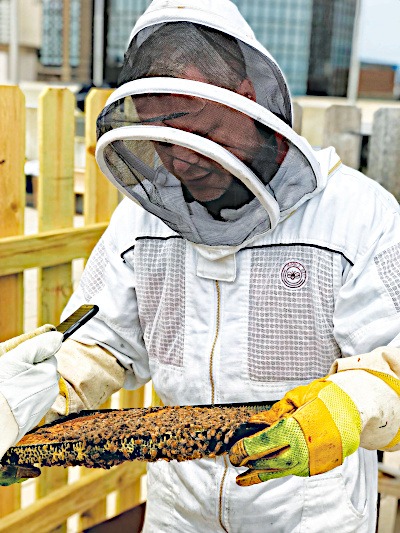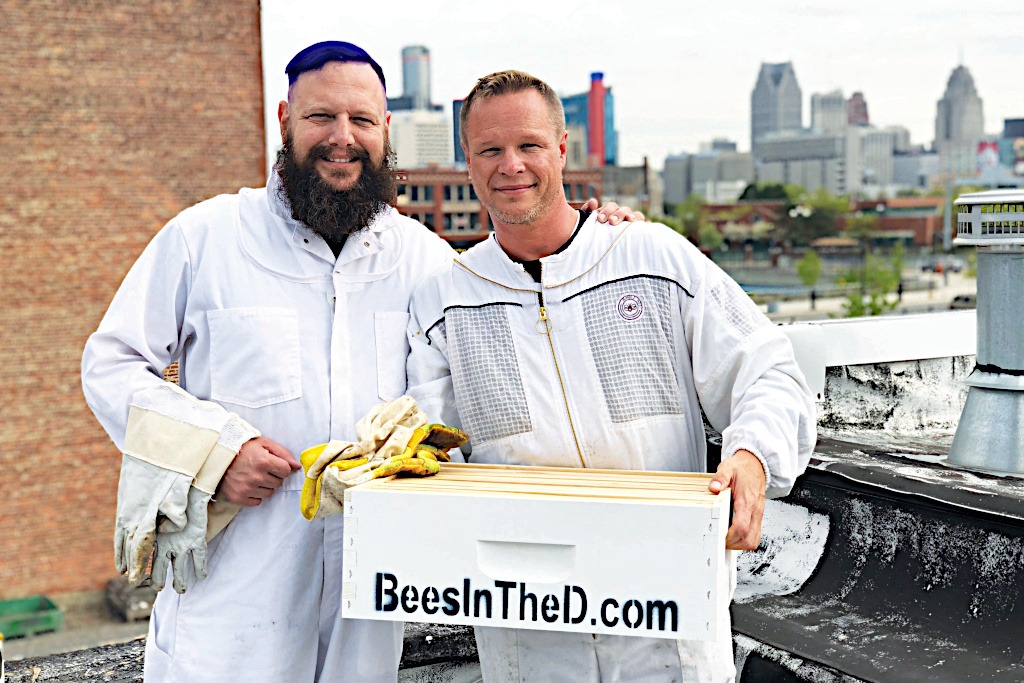Meanwhile, fans also enjoy Bees in the D joint events with area partners like Blakes Hard Cidery Co. & Tasting Room (17985 Armada Center Rd, Armada. Tel: 586-784-9463. www.blakeshardcider.com), and B.Nektar Meadery & Taproom (1511 Jarvis St., Ferndale. Tel: 313-744-6323. www.bnektar.com). Those gatherings are among the many year-round tastings and fundraisers for the organization, like the annual summer Bee-Bee-Q. Coming this fall, Peterson-Roest also tells of the upcoming party of the year, the “Beehive Ball” fundraising gala and avant-garde fashion show inspired by honeybees and beekeeping suits. Expect unforgettable beehive hairstyles, some of which may even be edible.

Brian Tending to His Bees
Detroit’s Green Culture
Bees in the D is part of the green wave that’s flooding Detroit with smart environmental solutions. Along with other non-profits like Detroit Dirt (www.detroitdirt.org), a zerowaste composting and educational organization, Peterson-Roest thinks his hometown is in a second Renaissance.
“I think the city and its residents are thirsting for anything that’s unique and collaborative, and actually it’s turning into a lot about
sustainability, which is really cool,” he says, adding that the city is naturally LGBTQ-friendly too. “Our sustainability programs are setting
high bars, they’re so incredible. And there’s such an entrepreneurial vibe here that I think people are a little bit more involved, and they’re excited to be a part of something. In Detroit, people want to help out and be a part of something that they believe in.”
Even better, the city has a distinct advantage to build sustainably because of what was once a liability: empty lots. Abandoned real estate was long considered detrimental, but today, open spaces are being transformed into urban gardens with diverse foliage—and yes, beehives.
In a tree-filled town like Detroit, green space is abundant. Peterson-Roest calls out Campus Martius Park for its summer “beach” scene and winter ice-skating, plus Capitol Park, Beacon Park, and other pocket parks that form a grassy chain through downtown. They’re complemented by bigger urban oases like Belle Isle Park, which occupies the entire 982-acre island in the Detroit River.
With help from Bees in the D, those parks serve as part of the “Detroit Bee Highway,” a series of safe havens across the greater region where pollinators can stop for food, water, and shelter during their daily high-mileage travels. The highway concept has been a great success thanks to businesses and residences looking to help protect and sustain bees. Between smaller contributions, and greater commitments like hosting a hive and learning how to keep bees, Peterson-Roest is optimistic about the future.
He notes that Bees in the D has grown much faster than expected, and this summer it will add around 50 new hives. Also likely is the creation of a honeybee educational center, the result of donated urban-garden space, a retired shipping container to be converted, and a volunteer architect keen to bring the project to fruition.
“I think people are starting to get it,” he says. “I think people are starting to realize that [honeybee sustainability] is important, and if we don’t do something about it, it’s going to be too late.” Throughout all his pursuits, Peterson-Roest always keeps his sight on serving his beloved bees.
“Beekeeping is of interest to all communities,” he says. “The thing about bees is that they don’t see orientation, they don’t see race, they don’t ethnicity. They just see you as a human, and they are so completely into their hive.”
In a way, Bees in the D operates similarly, with one common pursuit by a diverse board of directors who, Brian proudly notes, consists of people of different ethnicities, ages, and sexual orientations. Assembling a personality mix was a big factor behind launching the company in downtown Detroit, where it can foster inclusiveness and invite different perspectives. Likewise, the Bs are themselves in a symbiotic relationship too, with Roest-Peterson operating mostly behind the scenes. “He sets the stage, I get to shine,” says Peterson-Roest. Such community-building in the human realm, it seems, correlates to the working world of honeybees.
“I know this sounds a little weird, but I honestly believe that the bees know we are there to help them. It’s kind of like if you get a rescue dog—those dogs know that you’re helping them, and that’s all that matters. That’s also why I love working with children, they don’t put people int categories like we do so often as adults. And it’s what I love about Detroit too. It just feels like the whole city is welcoming towards differences. We’ve found nothing but open arms here.”


